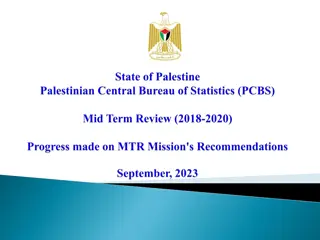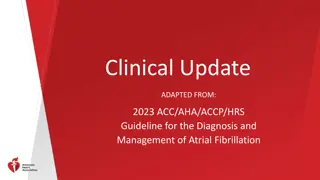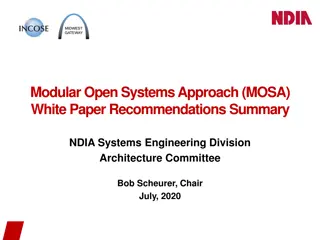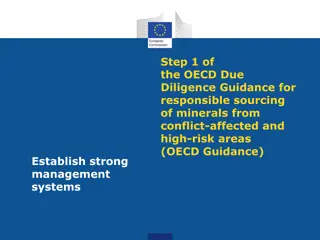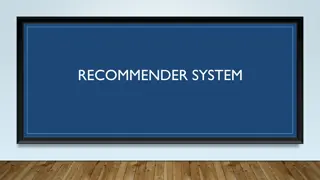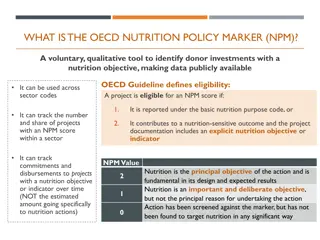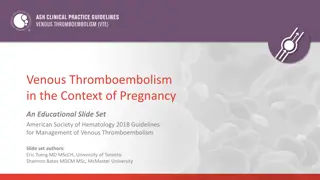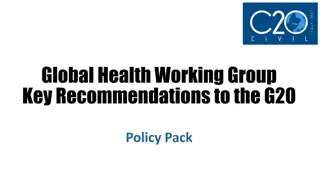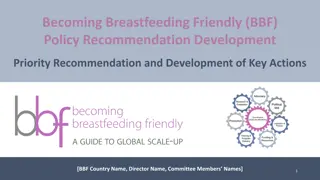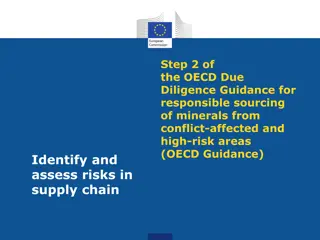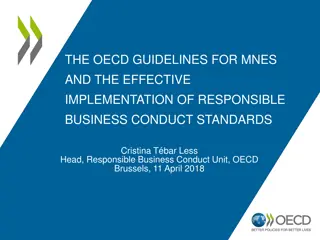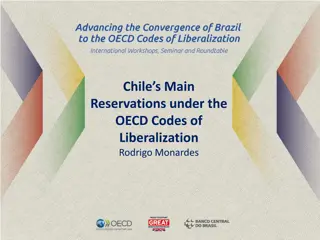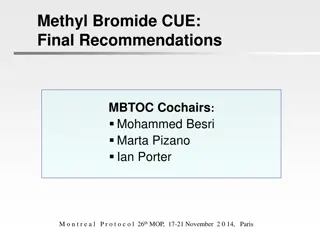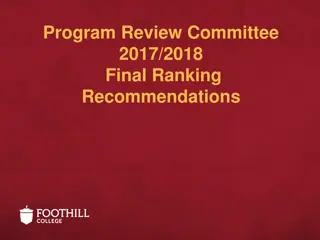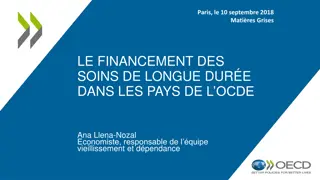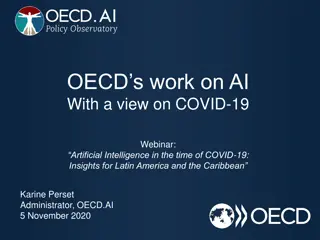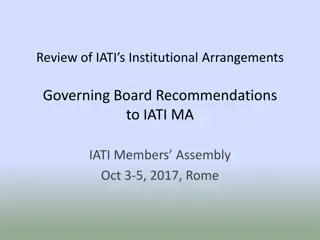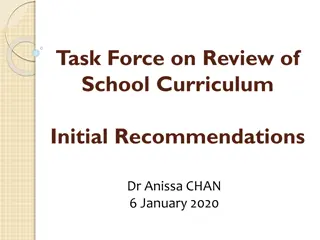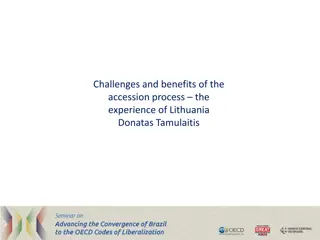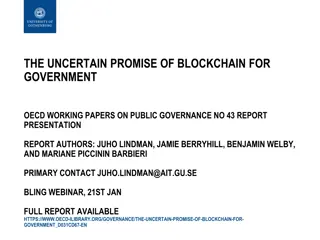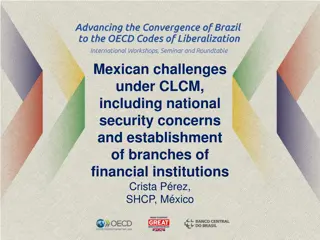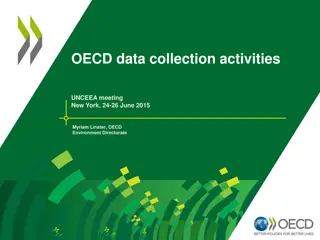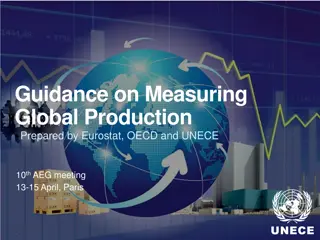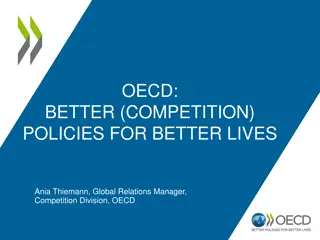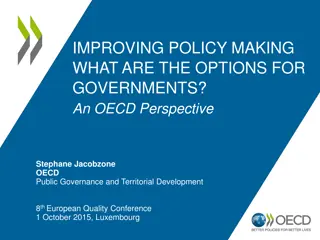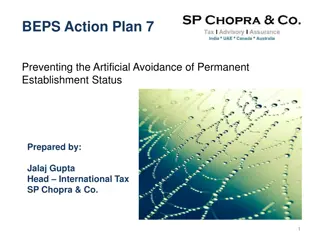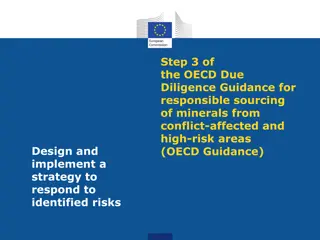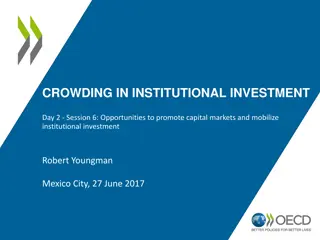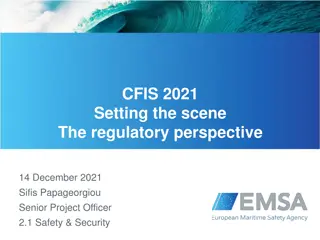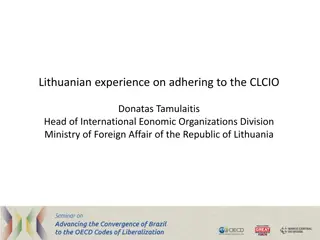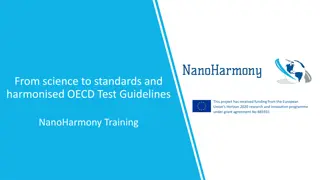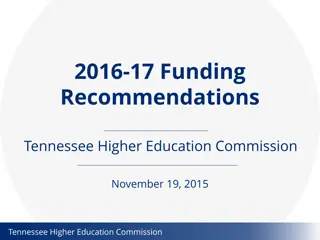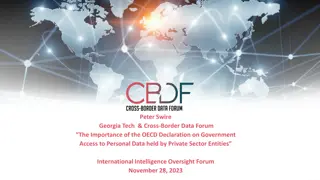Achieving Effective Delivery of Infrastructure Projects: Insights from OECD Seminar
Infrastructure investments play a crucial role in global development, but their successful delivery is becoming increasingly complex. Issues such as governance, ownership, and policy responsiveness can impact project outcomes. Without strategic management, projects may face challenges like inadequat
0 views • 24 slides
SUSTAINABLE WATER USE FOR GREEN HYDROGEN PRODUCTION: PRELIMINARY INSIGHTS FROM OECD WORK IN MONGOLIA
Preliminary insights from OECD work in Mongolia discuss the impact of green hydrogen production on water, sustainable approaches, and possible ways forward. The Sustainable Infrastructure Programme in Asia supports the transition towards net-zero infrastructure with a focus on enabling policies, pla
0 views • 14 slides
Challenges and Progress in Chilean Infrastructure Development
The challenges of Public-Private Partnerships (PPPs) in Chile within the framework of best practices and international standards are discussed, highlighting the need for long-term infrastructure planning and enhanced governance. The 2017 OECD Infrastructure Governance Review identified deficiencies
4 views • 40 slides
Progress Update on PCBS Program Recommendations (2018-2020)
PCBS recently received an External Review Mission to evaluate its program for 2018-2020. The recommendations covered statistical issues, strategy planning, leadership development, and fundraising efficiency, among other areas. Progress has been made on several recommendations, such as improving the
3 views • 15 slides
Challenges and Opportunities in Monitoring and Evaluation in OECD Countries
Monitoring and evaluation in OECD countries present unique challenges and opportunities, requiring clear mandates, ongoing processes, and robust institutional frameworks. The OECD approach emphasizes fostering quality, ensuring impact, and sharing lessons learned for efficient resource management. I
2 views • 12 slides
MAKING RECOMMENDATIONS
Providing recommendations is a crucial skill in both spoken and written English, especially for tasks like formal essays, reports, proposals, and letters. This guide covers different ways to give recommendations using modal verbs, passive voice, gerunds, and more. Get insights on modal/semi-modal ve
5 views • 16 slides
Clinical Update
This clinical update provides recommendations for the diagnosis and management of atrial fibrillation adapted from the 2023 ACC/AHA/ACCP/HRS guidelines. It includes information on class strength of recommendations, levels of evidence, and phrases for writing recommendations based on the quality of e
0 views • 46 slides
Modular Open Systems Approach (MOSA) White Paper Recommendations Summary
The National Defense Industrial Association (NDIA) Systems Engineering Division's Architecture Committee, chaired by Bob Scheurer, provides key recommendations from their MOSA white paper, focusing on promoting collaboration and innovation in defense and national security projects. The paper outline
0 views • 23 slides
EBTM 881 Capstone Project - Data Analysis and Recommendations
This EBTM 881 Capstone Project focuses on data analysis and providing recommendations based on the results. The project addresses a specific problem statement, reviews relevant literature and background information, analyzes data, presents models, discusses results and recommendations, and concludes
0 views • 10 slides
OECD Due Diligence Guidance: Establish Strong Management Systems
The OECD Due Diligence Guidance outlines the importance of establishing strong management systems for responsible sourcing of minerals from conflict-affected and high-risk areas. This involves adopting company policies, engaging with suppliers, implementing grievance mechanisms, and utilizing the 3P
0 views • 13 slides
Understanding Different Types of Recommender Systems
Recommender systems play a crucial role in providing personalized recommendations to users. This article delves into various types of recommender systems including Collaborative Filtering, Content-Based, Knowledge-Based, and Group Recommender Systems. Collaborative Filtering involves making predicti
0 views • 7 slides
Understanding the OECD Nutrition Policy Marker (NPM)
The OECD Nutrition Policy Marker (NPM) is a voluntary tool to identify donor investments with a nutrition objective. It helps mainstream nutrition in large-scale programs to improve outcomes and accountability. The NPM is applied at the project level to track investments and promote transparency in
1 views • 4 slides
ASH Guidelines on Venous Thromboembolism in Pregnancy
The American Society of Hematology (ASH) 2018 guidelines provide comprehensive management recommendations for venous thromboembolism in pregnancy. Key aspects include panel formation, clinical questions generation, evidence synthesis, and making recommendations. The guidelines offer strong and condi
0 views • 49 slides
Global Health Recommendations for G20 Policy Pack
Key recommendations focus on human-rights based, equitable access to healthcare, global solidarity in health, improving health and community systems through sustainable financing, and strengthening global health architecture. These recommendations aim to address inequalities, promote gender transfor
0 views • 6 slides
Developing Breastfeeding Friendly Policy Recommendations
Developing a Breastfeeding Friendly (BBF) Policy involves prioritizing key actions, assessing recommendation effectiveness, affordability, and feasibility. The process includes meetings to identify priority recommendations and propose actions accordingly. Key recommendations, accompanied by proposed
1 views • 9 slides
Responsible Sourcing in Conflict-Affected Areas: OECD Guidelines
The OECD Due Diligence Guidance outlines steps for companies to identify and assess risks in mineral supply chains from conflict-affected and high-risk areas. It explains Conflict-Affected and High-Risk Areas (CAHRAs) and the importance of due diligence in responsible mineral sourcing to avoid finan
4 views • 16 slides
OECD Guidelines for Responsible Business Conduct
The OECD Guidelines for Multinational Enterprises provide a framework for responsible business conduct, encouraging sustainable practices and minimizing negative impacts. The OECD's work on responsible business conduct focuses on enhancing economic and social well-being globally, emphasizing ethical
1 views • 30 slides
Chile's Financial Services Liberalization Overview
This content provides an in-depth look at Chile's main reservations under the OECD Codes of Liberalization, including its context of accession to OECD Free Trade Agreements and commitments to liberalization in services, investments, and financial services. It covers aspects such as cross-border trad
5 views • 20 slides
OECD Expert Group on Disparities in National Accounts Work Summary
The OECD Expert Group on Disparities in National Accounts focuses on developing methodology to produce distributional results for household income, consumption, and saving. Their work involves adjusting national accounts totals, identifying relevant variables from micro data sources, imputing missin
0 views • 15 slides
Methyl Bromide Usage Recommendations and Reporting Summary
The Methyl Bromide Technical Options Committee (MBTOC) provides final recommendations on the usage of methyl bromide for different sectors and countries based on reported stocks and proposed quantities for various commodities. The recommendations emphasize the importance of justifying the critical n
0 views • 12 slides
Program Review Committee 2017/2018 Final Ranking Recommendations
The Program Review Committee for 2017/2018 has finalized its recommendations based on rankings and meetings with various departments. Issues such as enrollment declines, productivity issues, and equity concerns were highlighted. The rankings of programs were color-coded into green, yellow, and red c
0 views • 10 slides
Financing Long-Term Care in OECD Countries: Insights and Challenges
The funding of long-term care services in OECD countries poses significant financial and organizational challenges, with a growing proportion of the elderly population requiring such services. This article delves into the financing mechanisms, the public funding landscape, and potential reform pathw
0 views • 10 slides
OECD's Work on AI in Response to COVID-19: Insights for Latin America and the Caribbean
OECD is focusing on AI in the context of COVID-19, emphasizing the importance of trustworthy AI for societal benefits. The organization has outlined principles for implementing AI in policies, with a goal of fostering an ecosystem that prioritizes human rights, transparency, accountability, and more
0 views • 18 slides
Review of IATI's Institutional Arrangements and Board Recommendations
Review of IATI's Institutional Arrangements and Board Recommendations presented at the IATI Members Assembly in Rome, covering categories of recommendations, decisions made by the Board, and recommendations pending MA approval regarding governance issues.
0 views • 22 slides
Task Force on Review of School Curriculum Initial Recommendations
The Task Force on Review of School Curriculum has provided initial recommendations focusing on enhancing students' capacity to learn, catering to diverse abilities and aspirations, promoting whole-person development, and articulating learning at primary and secondary levels. The recommendations incl
0 views • 23 slides
Challenges and Benefits of OECD Accession Process: Experience of Lithuania
The experience of Lithuania in the OECD accession process involves various objectives like national investment regime improvement, safeguarding measures, and coordination efforts with different ministries. Reservations and challenges in areas such as direct investment, real estate operations, and ba
0 views • 8 slides
The Uncertain Promise of Blockchain for Government - OECD Working Paper
This OECD working paper explores the potential impact of blockchain on government operations. Authored by Juho Lindman, Jamie Berryhill, Benjamin Welby, and Mariane Piccinin Barbieri, the report delves into the opportunities and challenges presented by blockchain technology in public governance. Juh
0 views • 19 slides
Challenges Faced by Mexico Under CLCM and Establishment of Financial Institutions
Mexico faced challenges related to national security concerns and the establishment of branches of financial institutions under the Codes of Liberalisation of Capital Movements (CLCM). The country's entry into the OECD in 1994 marked a significant period of liberalization and reforms, including exte
0 views • 13 slides
OECD Data Collection Activities Overview
OECD's data collection activities include interrelated work streams focusing on environmental data and indicators, database development, green growth, sectoral statistics, and regional analysis. The organization aims to provide comprehensive information to support policy-making and promote global co
0 views • 22 slides
Guidance on Measuring Global Production Prepared by Eurostat, OECD, and UNECE
Practical and conceptual guidance on measuring global production, including processing, merchanting, and ownership considerations. Recommendations from the Guide published in January 2016, with an emphasis on implementation and follow-up activities. Involvement of various organizations and countries
0 views • 14 slides
Promoting Better Lives Through OECD's Competition Policies
The OECD's Competition Division works towards promoting fairer development, better education, healthcare, pensions, and employment through its outreach programs and global forums. The Global Forum on Competition engages participants from around the world to discuss topics like fighting corruption, p
0 views • 15 slides
Enhancing Policy Making: Options for Governments - An OECD Perspective
Various tools and approaches are discussed to improve policy making, including foresight, cost-benefit analysis, and regulatory tools. The changing context of policy challenges is highlighted, along with the OECD policy toolkit's modular approach. Strategies like talking to leaders, engaging stakeho
0 views • 20 slides
Understanding BEPS Action Plan 7: Preventing Artificial Avoidance of Permanent Establishment Status
The Action 7 Report aims to prevent artificial avoidance of Permanent Establishment (PE) status by making changes to the PE definition in the OECD Model Tax Convention. BEPS refers to tax planning strategies exploiting tax rule gaps to shift profits to low-tax locations. The OECD issued 15 action pl
0 views • 10 slides
Responding to Risks in OECD Due Diligence Guidance
Develop and implement a strategic response to identified risks in accordance with the OECD Due Diligence Guidance for responsible sourcing of minerals. The process involves reporting findings to management, devising a risk management plan, implementing the plan, and assessing ongoing risks. Mitigati
0 views • 7 slides
Opportunities to Mobilize Institutional Investment in Capital Markets
Aligning trillions of dollars managed by OECD institutional investors towards green infrastructure investments presents a significant opportunity. Currently, only a small percentage of large pension fund assets are directed towards infrastructure, with an even smaller fraction allocated to green pro
0 views • 4 slides
Enhancing Safety Measures in Maritime Industry: FIRESAFE Recommendations and IMO Guidelines
FIRESAFE recommendations aim to improve safety on ships through cost-effective measures like fire monitors, alarm systems, and proper signage. The recommendations cover various aspects such as drencher systems, CCTV, and crew training. IMOs interim guidelines, influenced by FIRESAFE recommendations,
0 views • 9 slides
Lithuanian Journey Towards OECD Accession: Key Coordination Efforts
Lithuanian's experience in adhering to the CLCIO, coordinated by Donatas Tamulaitis, focuses on various processes including OECD accession, communication with Member states, management of recommendations, and more. The journey started in 2014 with the initial list of reservations and progressed thro
0 views • 14 slides
NanoHarmony Training: Standards and OECD Guidelines Overview
Delve into the world of standards and OECD Test Guidelines with the NanoHarmony Training material. Learn about harmonized test methods, the role of science in guideline development, engagement with OECD committees, and the process of creating OECD Test Guidelines. Explore how stakeholders can contri
0 views • 16 slides
Tennessee Higher Education Commission 2016-17 Funding Recommendations
The Tennessee Higher Education Commission's 2016-17 funding recommendations include operating appropriations, tuition recommendations, capital projects, and capital maintenance suggestions. The plan outlines allocations for outcomes formula units, TCATs, financial aid, general operating funds, and s
0 views • 14 slides
Challenges and Importance of Government Access to Personal Data in Cross-Border Intelligence Oversight
Reflecting on the significance of the OECD Declaration on Government Access to Personal Data held by Private Sector Entities, this content delves into the drivers necessitating an OECD-type process, such as law enforcement needs, globalization of criminal evidence, and convergence of civilian commun
0 views • 8 slides



